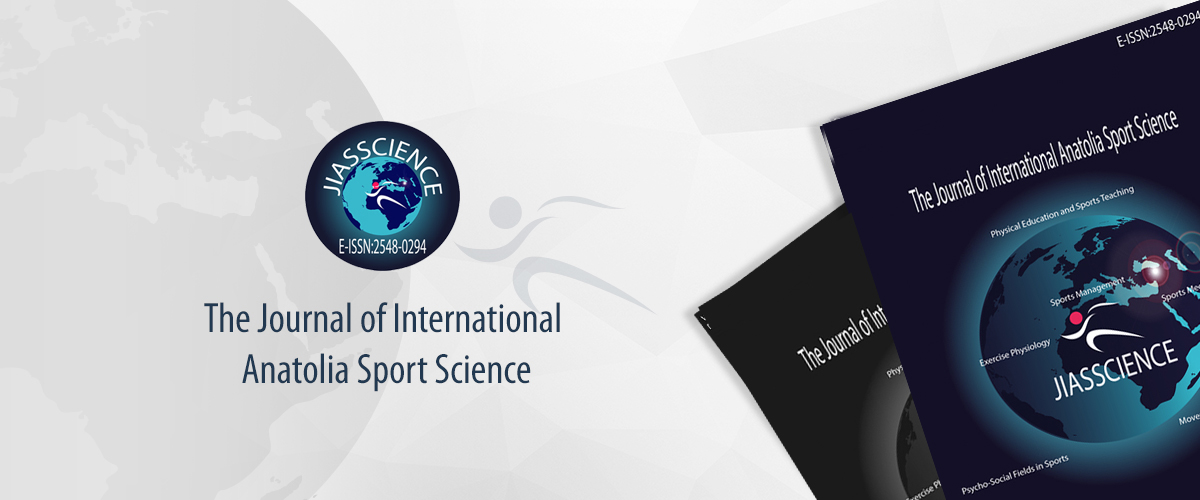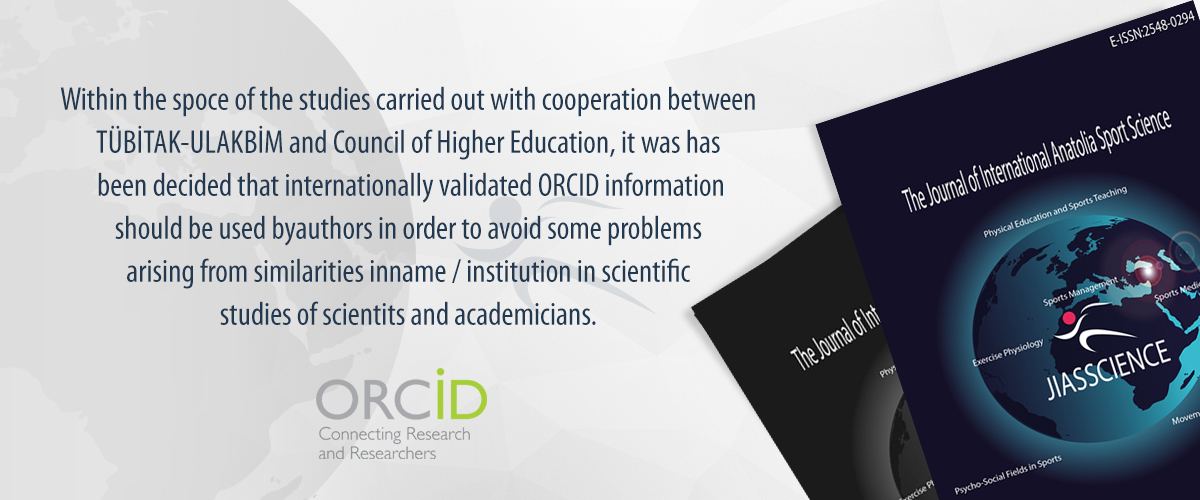







Ethics Guidelines
ETHICAL GUIDELINES FOR JOURNAL PUBLICATION
The Journal of International Anatolia Sport Science is dedicated to upholding ethical standards in publication and maintaining the quality of articles. Our commitment to ethics aligns with the guidelines established by respected organizations, including the Committee of Publication Ethics (COPE) and the Good Publication Practice Guidelines as outlined by the Annals of Internal Medicine. Furthermore, we diligently adhere to the ethical principles set forth by TR Index in managing the publication process.
Our ethical responsibilities encompass various aspects, including the conduct of our editors in their interactions with readers, authors, and reviewers, as well as the procedures we have in place for addressing any concerns or complaints that may arise.
We hold all parties involved in the publication processAuthors, Editors, Reviewers, and the Publisherto the highest standards of ethical behavior. Upholding these principles ensures the integrity of our journal and the trust of our readership and contributors.
For Authors:
Authors are expected to provide an unbiased discussion of their research's significance, along with sufficient details and references for replication. Deliberate misrepresentations or knowingly inaccurate statements are considered unethical and unacceptable. In the case of review articles, authors should aim for objectivity, comprehensiveness, and accuracy in presenting the state of the art. It is essential that authors ensure their work is entirely original; any use of others' work or words must be properly acknowledged. Plagiarism in any form is unethical and intolerable. Simultaneous submission of the same manuscript to multiple journals is unethical and unacceptable. Authors should not submit similar research to more than one journal. The corresponding author must ensure unanimous approval from all co-authors regarding the final paper version and its submission for publication.
For Editors:
Editors are responsible for evaluating manuscripts solely based on their academic merit. They should promote scholarly debate, academic integrity, and safeguard individual data. Editors must take appropriate action when misconduct is suspected and ensure the integrity of the academic record. Editors should not use unpublished information from submitted papers in their own research without explicit written consent from the authors. When ethical concerns are raised about a submitted or published manuscript, editors must take reasonable measures in response.
For Reviewers:
Reviewers must treat all received manuscripts as confidential documents. Any privileged information or ideas obtained through peer review must be kept confidential and not used for personal gain. Reviews should be conducted objectively, with clear observations and supporting arguments to help authors improve their papers. Reviewers who feel unqualified to assess a manuscript or anticipate delays in the review process should inform the editor and decline the review. Reviewers should not evaluate manuscripts in which they have conflicts of interest arising from competitive, collaborative, or other affiliations with the authors, companies, or institutions associated with the papers.
For a detailed understanding of our Publication Ethics and Publication Malpractice Statement, please refer to the provided link.
RESEARCH ETHICS (ETHICAL CONSENT FORM)
In line with the commitment to safeguarding the rights of both humans and animals, The Journal of International Anatolia Sport Science strictly adheres to the principles outlined in national and international ethical guidelines. For articles submitted to The Journal of International Anatolia Sport Science, Research Ethics Committee Approval is mandatory in the following cases:
- Research involving qualitative or quantitative methodologies that necessitate the collection of data from participants through methods such as surveys, interviews, focus group studies, observations, and/or experiments.
- Research involving the use of humans or animals (including their material/data) for experimental or other scientific purposes.
- Clinical research conducted on human subjects.
- Research involving animals.
- Retrospective studies that are carried out in compliance with the legislation on the protection of personal data.
PEER REVIEW PROCESS
The Journal of International Anatolia Sport Science follows a rigorous double-blind peer review process to ensure the quality and validity of published research. Here's an overview of the peer review process:
Initial Evaluation: Submissions are first assessed by the Editorial Board to determine if they align with the journal's scope. Manuscripts that do not meet the journal's criteria may be rejected at this stage.
Expert Reviewers: Manuscripts deemed suitable for the journal are sent to two independent expert reviewers. These reviewers evaluate the scientific quality of the paper. Importantly, the identities of the authors are kept hidden from the reviewers to maintain impartiality.
Review Process Confidentiality: Throughout the peer review process, the editors ensure that no information about the authors is disclosed to the reviewers, the editorial board, or the publisher.
Reviewer Feedback: After the evaluation, the editor conveys the results of the review process to the author. Authors are required to carefully consider the reviewers' comments and make revisions to the manuscript accordingly. Reviewers have the authority to reject a manuscript, while those with minor issues are sent back to authors for correction. Manuscripts are accepted only after approval by both independent reviewers.
Author Cooperation: Authors are expected to actively participate in the peer review process by promptly responding to editors' requests for raw data, clarifications, and proof of ethics approval and patient consents. If the initial decision is "revisions necessary," authors should systematically address reviewers' comments and resubmit their revised manuscript by the given deadline.
Editorial Decision: The final decision to accept or reject a manuscript rests with the editorial board. They are responsible for upholding the scientific and ethical standards of the journal.
Review Duration: The evaluation process typically takes between 1 to 3 months. However, the duration may vary based on the reviewers' availability and the complexity of the evaluation. The editorial team strives to expedite the handling of manuscripts when necessary.
This thorough and impartial peer review process ensures that only high-quality, ethically sound research is published in the journal.
OPEN ACCESS POLICY
The Journal of International Anatolia Sport Science is an open access journal which means that all content is freely available without charge to the user or his/her institution. Users are allowed to read, download, copy, distribute, print, search, or link to the full texts of the articles, or use them for any other lawful purpose, without asking prior permission from the publisher or the author. The entire editorial and publishing process of our journal is done in accordance with the publishing principles published by the International Committee of Medical Journal Editors (ICMJE), the World Association of Medical Editors (WAME), the Council of Science Editors (CSE), the European Association of Science Editors (EASE), the Committee on Publication Ethics (COPE).
PLAGIARISM POLICY
The Journal of International Anatolia Sport Science has a comprehensive policy in place for addressing different levels of plagiarism. Here's a summary of the policy:
Minor Plagiarism:
Definition: Short sections of other articles or papers are plagiarized with a minimum similarity index of 20% (as checked by plagiarism detection software).
Action: Authors are issued a warning and asked to revise their text, properly citing the original source.
Intermediate Plagiarism:
Definition: A significant portion of a paper is plagiarized without proper citation to the original source.
Action: The submitted article is rejected, and the authors are prohibited from submitting further articles for one year.
Severe Plagiarism:
Definition: A substantial part of a paper is plagiarized, which includes reproducing original results or ideas from another publication.
Action: The paper is rejected, and the authors are banned from submitting further articles for five years. In the case of a second instance of plagiarism by the same author(s), the Editorial Board, including the Editor-in-Chief and Editorial members, will decide on further measures, which may include a permanent ban on submitting articles.
Self-Plagiarism:
Authors are expected to properly identify and reference any previously published material, even if it's their own work. Permission from the original copyright holder must be obtained if needed.
Overlap with Simultaneously Submitted Manuscripts:
If an author submits a manuscript with significant overlap with another manuscript submitted to another journal simultaneously, it will be treated as plagiarism.
Translation and Republication:
Authors must identify and obtain permission for material originally published in another language. The editor may decide whether to accept a translated publication.
Layout Editor Responsibility:
The journal's layout editor is responsible for maintaining a list of authors subjected to penalties and ensuring that banned authors are not involved in the review process.
Publication of Policy:
This plagiarism policy is posted on the journal's website and is provided to authors upon the initial receipt of their manuscript.
This policy underscores the journal's commitment to maintaining academic integrity and ensuring that all published work is original and properly cited. Violations of this policy are taken seriously and can result in severe consequences for authors found guilty of plagiarism.
This policy also extends to instances where an author incorporates material from their previous publications. When an author utilizes text or figures that have been published before, they must clearly indicate the relevant paragraphs or figures and provide proper references to the original publication. This applies even more so in cases involving review papers or tutorials, as a substantial portion of the content may have been previously published.
Authors are responsible for acknowledging the source of any material previously published and obtaining the necessary permissions from both the original author and the publisher. Additionally, if an author submits a manuscript to The Journal of International Anatolia Sport Science that significantly overlaps with a manuscript concurrently submitted to another journal, and this overlap is discovered either during the review process or after both papers have been published, the editor of the other journal is promptly informed. In such cases, it is treated as a severe form of plagiarism.
Significant overlap, in this context, refers to the use of nearly identical figures and text that constitutes more than half of the paper. Self-plagiarism involving less than half but more than one-tenth of the paper falls under intermediate plagiarism. If self-plagiarism is limited to the methods section, it is categorized as minor plagiarism.
In situations where an author wishes to utilize their previously published material to enhance the clarity of new results, they must clearly identify the previously published material and highlight the distinctions from the current publication. Permission to republish this material must be obtained from the copyright holder.
For manuscripts originally published in conference proceedings and subsequently submitted to The Journal of International Anatolia Sport Science, whether in identical or expanded form, authors are required to disclose the conference proceedings' title and publication date. Additionally, they must secure permission to republish from the copyright holder. It's important to note that the editor may choose not to accept such papers for publication.
In summary, this policy ensures that authors adhere to ethical standards regarding the reuse of their previously published material and the proper acknowledgment of sources. Violations of this policy may result in significant consequences for authors, including potential rejection of their submissions.
RETRACTION POLICY
The Journal of International Anatolia Sport Science maintains a policy for retracting published papers under the following circumstances:
Unreliable Findings: Papers may be considered for retraction if there is clear evidence that the findings are unreliable. This could be due to misconduct such as data fabrication or honest errors such as miscalculations or experimental errors.
Redundant Publication: Papers may be subject to retraction if the findings have been previously published elsewhere without proper cross-referencing, permission, or justification. This includes cases of redundant publication.
Plagiarism: Any paper found to constitute plagiarism may be retracted.
Unethical Research: Papers that report unethical research may also be considered for retraction.
The retraction process follows the guidelines outlined by the Committee on Publication Ethics (COPE), which can be accessed in detail at COPE Retraction Guidelines.
This policy is in place to maintain the integrity of the journal and ensure that published research meets the highest ethical and academic standards.


